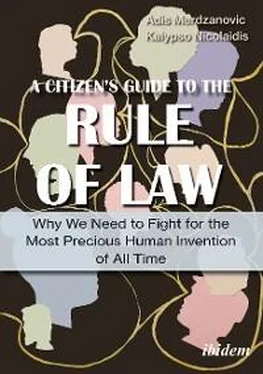But by appealing to our shared intuitions, our experiences, and our common understanding of how the world works or, at least, ought to work, we hope to provide a practical guide and make these complex topics understandable. Yes, we do use political and legal theory, political science and philosophy in our arguments. But we hope to present a handy guide that speaks to practitioners, but also well beyond, to all concerned citizens.
Sometimes we use thought experiments to make our arguments clear, and when we can, we offer real-world examples from across the continent. Forgive us for often avoiding specific country names for the sake of generalisation, if not anonymity. As should be clear by now, we are less concerned about where any concrete attack on the rule of law has happened, and more about the patient we seek to nurture, the combined consequences of continuous attacks for every day citizens. This wondrous creature of ours must be strengthened once again by our collective life force. By taking a position of levity and introducing a good portion of humour, our ambition is to suggest how we can save the rule of law.
But more than that, we want this book to offer a call for action and for engagement.
This book seeks to be an accessible but nevertheless sophisticated handbook for rule of law and its promotion by EU citizens. We wish to learn from the mistakes of the past and to suggest new pathways. We will deal not only with the question of how the rule of law should be promoted, but also with what it actually means in practice—in EU member states and in those countries wishing to join the Union. From Bucharest to Rome, from Madrid to Zagreb and from Priština to Sarajevo and Ankara, we wish to speak to all citizens, so that together, we can save the rule of law from its attackers.
In Chapter 2 (When rule of law meets EU accession) we properly introduce the concept of rule of law and discuss its position within what we have increasingly come to call “liberal democracy”. In this book, we have chosen to look at the rule of law through the prism of accession to the EU because we think that this is where most questions of the rule of law become virulent. As we shall explain further in the chapter, we see the EU’s accession process as a “proof of concept” for our new understanding of the rule of law, with the latter’s principles being far more widely applicable than to EU enlargement.
Chapter 3 (Rule of law promotion, EU-style) reviews the shortcomings of the rule of law approach currently promoted by the European Union. We will explain how the current approach does not really fit with what a deeper concept of rule of law should be. We will look at what the EU has done so far to promote the rule of law, and discuss why it did not work. Consider this chapter an introduction to the EU’s rule of law efforts, even if we don’t like to call it that because introductions are rarely read with the carefulness they should be read.
Chapter 4 (The Fundamental Dilemma of EU Rule of Law Promotion) presents what we call EU’s rule of law “promotion dilemma”, a kind of catch-22-situation in which the EU finds itself. On the one hand, the EU has to be rather intrusive so as to enable a sustainable rule of law framework in future member states; on the other, it has to show restraint due to developments within the EU that may negatively impact its credibility. It also has to pay attention to the larger context in which it intervenes. We show that the inconsistencies this creates could be avoided if the EU adapted its understanding of the rule of law. We also show what the consequences of the current approach are and where a new approach should start.
Chapter 5 ( Taking on the rule of law dilemma by being more ambitious) presents some of the building blocks of this new approach. Our solution consists of reframing the debate under the seemingly contradictory headline of being “humbler and more ambitious” in order to make the rule of law stick. We need to prevent digressions and make reforms permanent or “sustainable”, as we shall call it. Sustainable rule of law involves the entire society, not just lawyers, bureaucrats, and judges. As chapter 5 will explain, the EU’s rule of law promotion therefore needs to be more ambitious . It needs to engage with citizens, non-governmental organisations, interest groups and many more. It needs to become part of the social fabric.
At the same time, however, we argue in chapter 6 (Taking on the rule of law dilemma by being humbler) that to make rule of law promotion sustainable, the EU has to be humbler in what it presents as the “EU model” of the rule of law. Such a model simply does not exist. Different EU member states have different rule of law frameworks, all of which are supposed to be compatible with the EU’s rule of law norms. Acknowledging that would open up new spaces for manoeuvre and reform in the candidate countries. So, humility from the EU is a good start.
While these discussions are rather theoretical, chapter 7 (Promoting the rule of law in practice: the “living list”) offers a more practically oriented guide of how to deal with rule of law and its promotion on the ground. We examine the EU’s strategy in resolving the constitutional and political crisis in North Macedonia in 2015 focussing on concrete challenges to the rule of law in the country. Broadening our perspective, the chapter then presents our new approach for the EU’s rule of law promotion, which centres on a citizen-based perspective of what the rule of law actually is. We discuss the actors that should be involved in monitoring the rule of law in a country and present a “living list” of indicators and questions that should guide rule of law assessments in a country. The beauty of this list is that it can be employed in member states as much as in EU candidate countries.
Chapter 8 concludes the book by putting the rule of law and its promotion into a larger context and arguing for an engagement of each and every individual as guardian of the rule of law. It brings us back to the beginning of this chapter and our call for action.
***
As you see, our goal is to provide our readers with all the information and tools they need to understand the challenges of the rule of law and its promotion.
But we freely confess, we have an ulterior motive. It is our deep belief that the rule of law is not something that lives on paper or in some procedure, but as a principle of living together that should be nurtured within each of us. We hope that you, dear reader, will do so, not primarily because you believe it’s necessary for the development of your country or for joining the European Union one day, but because you too believe in the rule of law, as humankind’s most precious invention . Because you realise how important it is for it to be kept alive and how dangerous it is to let it die. We are missionaries in the truest sense of the word.
But we ask even more. Let us become an even more active community. Let us approach our politicians and demand sustainable rule of law in a language both we and they understand. Let us fight small rule of law breaches as vigorously as we would fight larger ones. And let us speak up when the rights of our neighbours, our journalists, or our judges are being infringed upon.
And together, for everyone’s sake, we can save the rule of law.
Chapter 2.
When rule of law meets EU accession
For years, if not decades now, there has existed a fundamental misunderstanding in what we think the rule of law means in practice. It’s easy to see this misunderstanding when we look at an area in which the rule of law is supposedly at the centre of everyone’s attention: the EU’s accession policy.
Читать дальше












